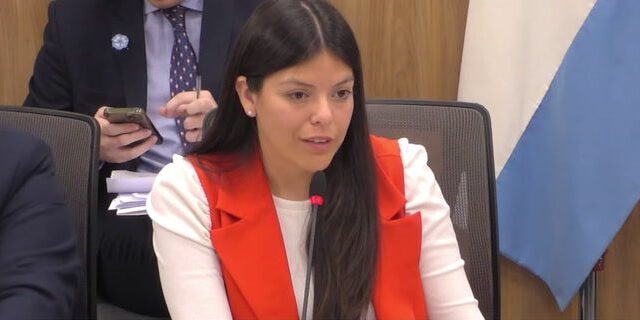BTN News: In a fiery confrontation that highlighted the growing tensions around freedom of expression in Argentina, journalist Romina Manguel faced off with Alberto Benegas Lynch, a national deputy from the La Libertad Avanza (LLA) party, during a recent session of the Freedom of Expression Committee in Buenos Aires. The clash, marked by sharp exchanges and accusations of dishonesty, continued beyond the committee’s walls, spilling over onto social media with LLA’s Lilia Lemoine joining the fray. The dispute centered around Manguel’s criticism of President Javier Milei‘s stance on media freedom and allegations of attempts to discredit her following a controversial interview with Benegas Lynch. As the debate escalated, both sides called for honesty and transparency in political discourse, reflecting broader national conversations about censorship, self-censorship, and the role of the press in Argentina.
Tensions Erupt in Freedom of Expression Committee
The confrontation began when Romina Manguel attended the Freedom of Expression Committee to present her concerns regarding recent attacks on the press by President Javier Milei. Drawing on a personal example, she referred to an interview she had conducted with Alberto Benegas Lynch, in which the deputy made comments on child labor that sparked significant controversy. Manguel accused Lynch of not standing by his words and failing to clarify that her representation of his statements was accurate, leading to further attacks from Milei.
“I merely quoted what was said,” Manguel argued, defending her integrity as a journalist. She urged the committee to listen to the full interview to judge whether any part had been misrepresented. Lynch, however, responded by accusing Manguel of using the controversy for personal gain, a charge she firmly denied.
Social Media Feud Adds Fuel to the Fire
The conflict continued beyond the committee room, moving swiftly to social media. Manguel took to X (formerly Twitter) to address what she described as “serial defamers” accusing her of self-censorship. Lilia Lemoine, Lynch’s colleague in the LLA, quickly responded, mocking Manguel for allegedly allowing herself to be intimidated by online trolls.
“Stop playing the victim,” Lemoine wrote, “You’re not a 12-year-old girl; you’re a seasoned journalist.” Manguel shot back, questioning why Lemoine hadn’t addressed her face-to-face during the session, suggesting that perhaps Lemoine was following directives not to engage with her publicly. “Is that what the President advised you?” she asked, in a pointed reference to Javier Milei’s supposed recommendation against appearing on her platform.
Milei’s Controversial Stance on Press Freedom Under Fire
Central to the debate is Javier Milei‘s approach to the media, which has drawn criticism from journalists like Manguel who argue that his tactics undermine freedom of expression. Manguel pointed out that after the contentious interview with Benegas Lynch, Milei publicly disparaged her, accusing her of trying to create divisions within the government.
“It is critical,” Manguel said, “that public figures, especially those in power, adhere to a standard of honesty.” She called on Benegas Lynch to clarify that her portrayal of his statements was accurate and to resist Milei’s attempts to stifle dissenting voices.
Benegas Lynch, meanwhile, defended his position, claiming that he had been misquoted and that the media, including Manguel’s program, often takes statements out of context to stir controversy. “The citation in journalism should be sacred,” he stated. He also claimed that he had initially found Manguel to be an “engaging host,” but had reconsidered after the interview was aired.
Censorship, Self-Censorship, and the Role of Media in Argentina
The debate has broader implications, touching on issues of censorship and self-censorship in Argentina’s politically charged climate. Manguel argued that online harassment and direct attacks from political figures contribute to a “more subtle, less visible form of censorship” — self-censorship, where journalists may hesitate to speak freely for fear of repercussions.
In response, Lemoine and others in the LLA dismissed Manguel’s concerns as an attempt to play the victim, insisting that the journalist should take responsibility for her own words and actions. This stance sparked a heated exchange online, further illustrating the polarized nature of Argentina’s political discourse.
A Call for Accountability and Integrity in Political Dialogue
As the argument continued to spiral, Manguel made a final appeal for accountability and integrity in public debate, urging political figures to stand by their words and promote honest communication. “If we are to respect freedom of expression,” she emphasized, “then we must also respect the truth and the right of the public to hear it.”
The Freedom of Expression Committee session ended with no resolution to the conflict, but it underscored the ongoing tensions between Argentina’s media and the government. As political divisions deepen, debates over the role of journalists, political accountability, and the limits of free speech are likely to continue playing out both in public forums and online.
Conclusion: The Future of Media Freedom in Argentina
The clash between Romina Manguel and Alberto Benegas Lynch serves as a microcosm of the larger battle for media freedom in Argentina. As debates over censorship and the role of the press intensify, the question remains: how will Argentina navigate the balance between political power and the fundamental right to free expression?


